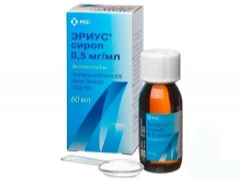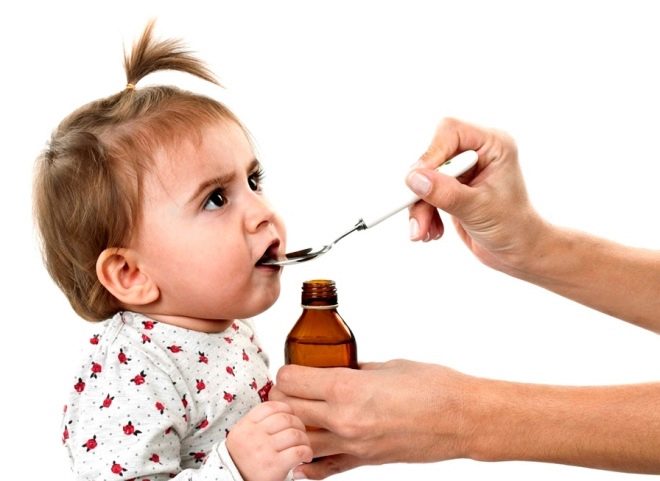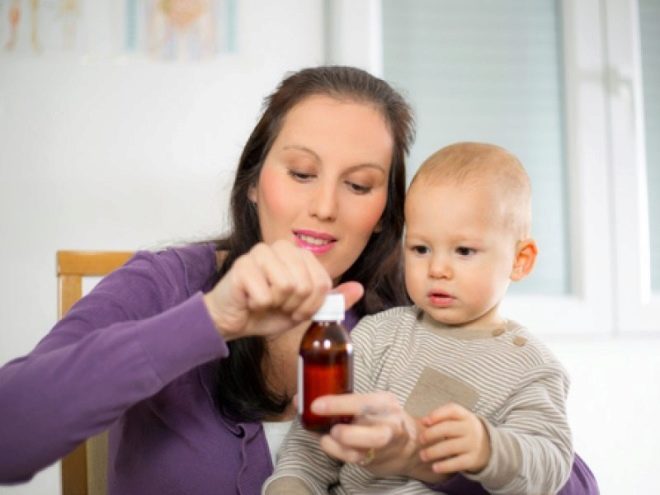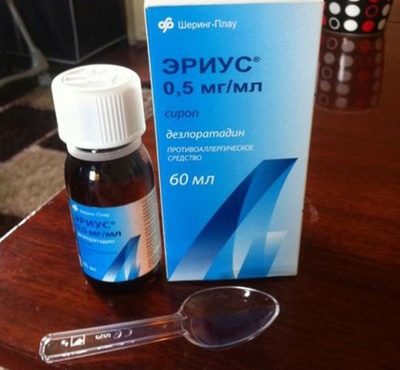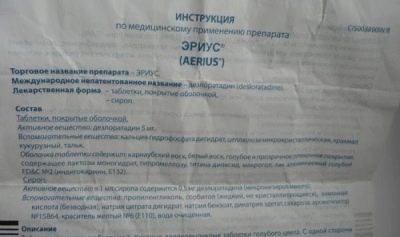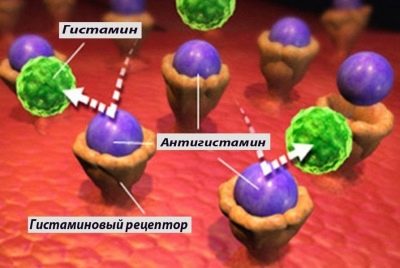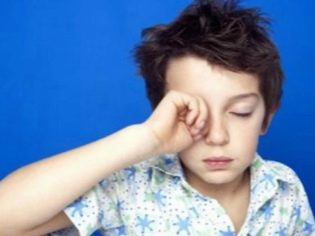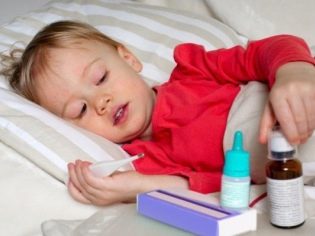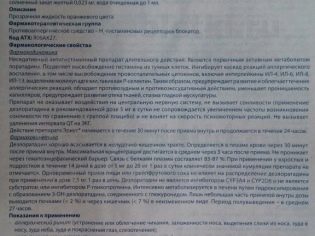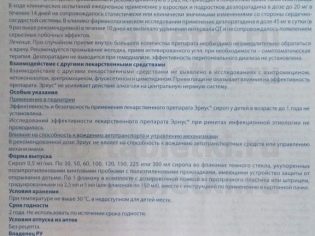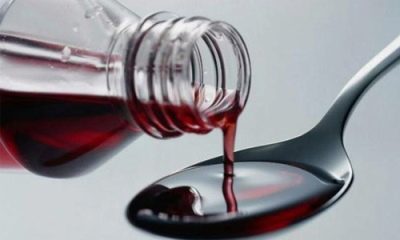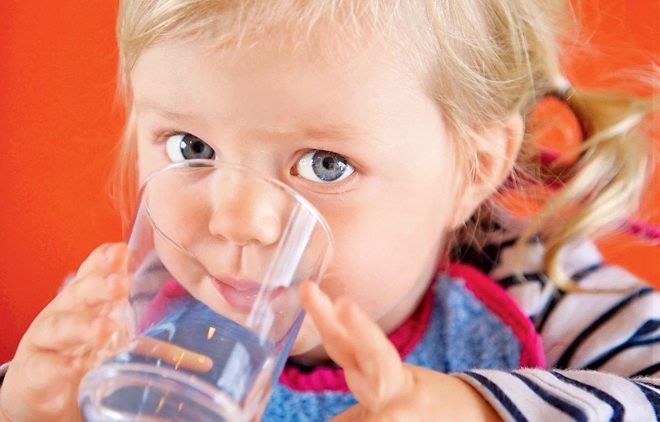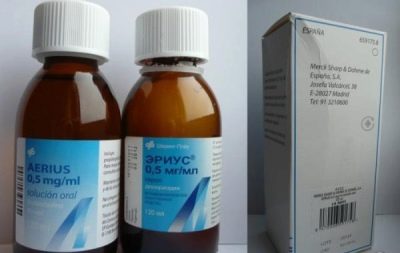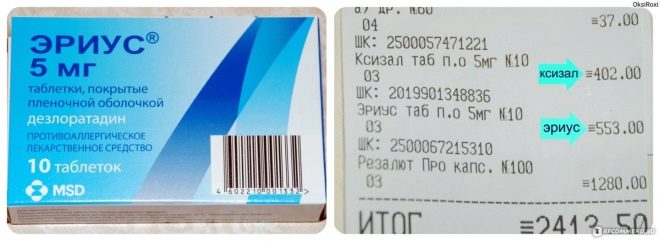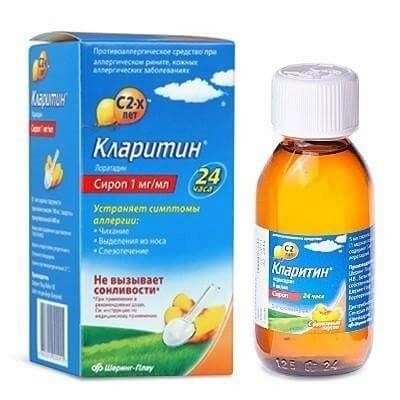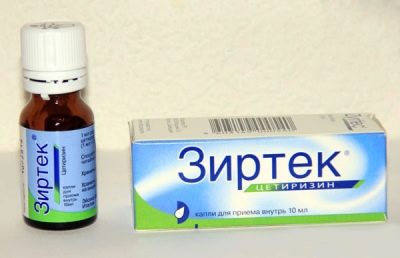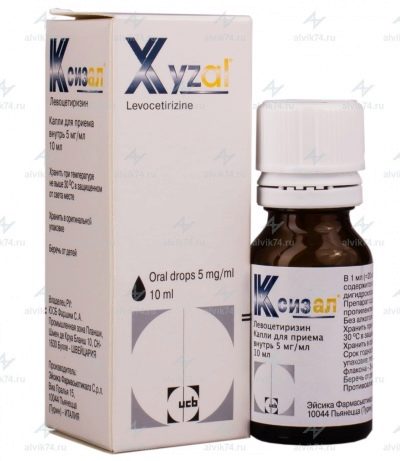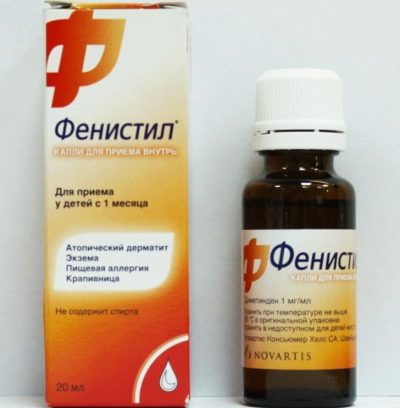Erius syrup for children: instructions for use
"Erius" is a very popular drug among modern antihistamine drugs. It helps to get rid of various manifestations of allergy, for example, strong watery eyes, skin rashes or sneezing attacks. If it is necessary to prescribe such a medicine to a child, the syrup is most often chosen, because this form of Erius is considered to be a child.
Benefits
Unlike other dosage forms, "Erius" in syrup can be used even in the smallest patients. It is contraindicated only to kids up to a year. In addition, because of the liquid consistency and sweet taste, it is very easy for young children to drink such a remedy, and it is often difficult for such patients to swallow tablets.
Since this drug belongs to the third generation, it does not penetrate to brain cells and does not inhibit the central nervous system. This causes the absence of a pronounced sedative side effect. In addition, like other antihistamines of the 3rd generation, Erius acts rather long, which allows you to take the syrup only once a day.
According to reviews, most young patients tolerate the drug well. Even if you accidentally exceed the dose a little, Erius will not cause any toxic effects. In addition, the list of negative side effects that sometimes develop with treatment with this remedy is much shorter than that of antihistamine medicines from the first and second generations.
Release form
Liquid version of "Erius" is sold in bottles made of dark glass. Inside the bottle is 60 or 120 milliliters of clear orange liquid, which has a sweetish taste. Next to the syrup bottle in the box you can see a plastic spoon. It is used to dispense medication and holds 5 milliliters of syrup. In addition, there is a mark of "2.5 ml" on the spoon to measure the drug for kids.
Composition
The main component of the drug is called desloratadine and is a metabolite of loratadine - another substance with antihistamine action, which belongs to the second generation. The dosage of the active substance in 1 ml of liquid "Erius" is 500 μg, that is, from 2.5 ml of the drug the patient will receive 1.25 mg, and from a full measuring spoon - 2.5 mg.
Additionally, edetate disodium, sodium citrate, citric acid and sorbitol are added to the syrup. In addition, the drug contains propylene glycol, sodium benzoate, flavoring and water. For sweet taste in liquid "Erius" there is sucrose, and the bright color is due to the yellow dye.
Operating principle
The active substance of the syrup blocks receptors that are sensitive to histamine (they are called H1 receptors), and also suspends the process of releasing biologically active compounds involved in the inflammatory allergic reaction. Under the action of "Erius" decreases the permeability of small blood vessels and relaxes smooth muscles, which leads to the elimination of edema (antiexudative effect). In addition, the syrup is noted and antipruritic effect.
Such therapeutic effects of the drug help to get rid of the different symptoms, which manifest an allergic reaction. With the prophylactic use of "Erius" does not allow the occurrence of clinical manifestations in response to contact with the allergen. Since desloratadine does not pass through the hemato-encephalic barrier, the syrup does not affect the speed of reactions of the nervous system and causes drowsiness very rarely.
The onset of the drug can be noticed within 30 minutes after the child has swallowed the syrup. Its duration can be up to 24 hours, so for a persistent therapeutic effect, it is enough to drink the drug only once a day.
Indications
One of the main reasons to prescribe a child "Erius" is allergic rhinitis nature. Also, the syrup is in demand for different skin manifestations of allergies, for example, with urticaria. Syrup can also be given with chickenpox to reduce itchy bubbles.
Contraindications
"Erius" is not prescribed to children with hypersensitivity to any of the components of the syrup or to loratadine. Since the composition of the drug includes sorbitol and sucrose, it cannot be used in children with hereditary diseases when carbohydrate absorption is impaired (with fructose intolerance and other problems).
For renal failure, severe treatment with Erius requires the supervision of a physician.
Side effects
Due to the use of "Erius" may appear:
- headache;
- loose stools;
- fever;
- fast fatiguability;
- feeling of dry mouth;
- insomnia;
- tachycardia;
- allergic rash;
- abdominal pain and other symptoms.
The occurrence of any of these ailments should be a reason to consult with your doctor and, if necessary, cancel the medication.
Instructions for use
For dosing syrup is recommended to use a spoon, which is in the box with the bottle. Additionally, dilute the medication with water is not necessary. After giving the right amount of syrup to the child, you can offer some water so that the baby can drink the sweet medicine.
The frequency of taking "Erius", as noted above - only once a day. It is advisable to give a syrup to a small patient at the same time, for example, if treatment is started in the evening, then on the following days the medication should be taken in the evening.
Since the food does not affect the absorption of desloratadine, the diet also does not matter for the time of reception of the syrup.
How the drug should be taken to a small patient should be determined by the doctor, taking into account the diagnosis and the body's response to the medication. If “Erius” is prescribed during seasonal rhinitis, then after the disappearance of the uncomfortable symptoms, the intake of syrup can be stopped, and when they appear, it can be resumed. If the child has a year-round form of rhinitis, the medication is recommended to take the entire period when contact with allergens is possible.
Dosage
For the treatment of young children under 5 years of age, only syrup is used, and a single dose for a patient of 1-5 years is 1.25 mg desloratadine. This amount of active ingredient is contained in two and a half milliliters of syrup. To get the right dose of medication for a child of that age, you need to fill the dosage spoon with the medicine to the line marked “2.5 ml”.
If a child is from 6 to 11 years old, he should receive 2.5 mg of desloratadine per day, which corresponds to 5 ml of syrup. Such patients are given to drink the drug from a full measuring spoon. For children over 12 years old, a single / daily dose of Erius will be 5 mg. This means that at one time a teenager should receive 10 ml of syrup (drink the medicine in the amount of two measuring spoons).
Overdose
According to research, a small overdose (up to five doses allowed by age) does not provoke any negative phenomena. If a small patient accidentally drank more syrup, you should consult a doctor and do a gastric lavage, and then give the child an enterosorbent.
Compatibility with other drugs
The instructions for the syrup marked the possibility of its combination with drugs that contain erythromycin, cimetidine, ketoconazole, azithromycin or fluoxetine. Information about compatibility with other drugs manufacturer does not provide.
Terms of sale
"Erius" in liquid form can be freely purchased at any pharmacy, because it is a non-prescription drug. On average, for 60 ml of syrup, you need to pay 550-650 rubles.
Storage conditions
Storage of syrup at home is recommended at temperatures up to +30 degrees in a dry place. To prevent an accidental overdose, the bottle should be stored where small children cannot get it. The shelf life of the drug is marked on the box and is 2 years. After opening the bottle, it does not change.
Reviews
About the treatment of children "Erius" speak mostly positively. According to moms, under the action of syrup, nasal congestion is quickly eliminated, itching in the nasopharynx disappears, constant sneezing stops and mucus becomes less. The efficacy of the drug is also noted with skin rash and itchy dermatosis.
The main advantages of the drug are the possibility of use from 1 year, ease of dosing, a single dose and a pleasant taste. Among the shortcomings, many mothers mention the high prices of syrup, because of which they are interested in cheaper products. Some parents do not like the presence in the liquid "Erius" flavoring, coloring, sugar and other chemical additives. Also, sometimes there are negative reviews, in which they complain about the appearance of side effects.
Analogs
If it is impossible to use "Erius", the doctor may recommend a similar medicine, the effect of which causes the same active ingredient. Among such drugs in the syrup produced "Blogir-3", "Lordestin" and "Elysée". In addition, the solution can be used.Desal". Other analogues are represented by solid form, so they are not prescribed for children under 6 years old.
Other antihistamine medicines belonging to the second or third generation can also be replaced by "Erius", for example:
- «Claritin». In childhood, he is most in demand in the form of syrup, which has a peach flavor. The basis of this medication is loratadine. The tool is in demand for urticaria, allergic nature of the head cold, angioedema, chickenpox and so on. Children can give it from 2 years.
- Zyrtec. The liquid form of such a drug is represented by drops, and the effect is due to cetirizine. Like Erius, the drug begins to act within 20-30 minutes and provides antiallergic effect for 24 hours. It is prescribed to children with a runny nose and conjunctivitis, if they are provoked by allergens. The drug is also in demand for allergic cough, dermatitis, chicken pox, laryngitis and other diseases.
In children, it can be used from 6 months of age.
- "Xizal". Such drops contain levocetirizine and can be used from the age of two. They are prescribed to young patients suffering from hay fever, urticaria, pruritus, angioedema and other allergic reactions.
- "Fenistil". This antihistamine drug in drops can be given even to infants over 1 month old. It contains dimetinden and is effective for allergic rhinitis, angioedema, itching for chickenpox, allergies to drugs and other problems.
Read more about allergy medications for children in the next video.
